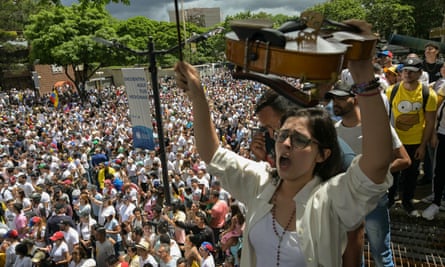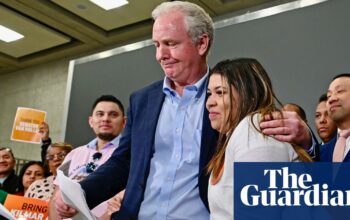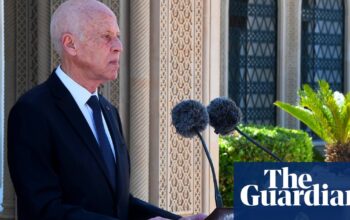The US has recognised Edmundo González as the winner of Venezuela’s disputed election, claiming there is “overwhelming” evidence of Nicolás Maduro’s defeat, as anti-government protesters prepared to return to the streets to demand political change.
Maduro, under whose 11-year presidency Venezuela has taken an increasingly authoritarian tack and been plunged into economic chaos, has claimed victory in last Sunday’s vote, despite a mounting body of evidence suggesting he lost.
On Thursday night, the US secretary of state, Antony Blinken, rejected the incumbent’s claims and recognised González as Venezuela’s president-elect. Blinken said tally sheets obtained by Venezuela’s opposition indicated that González “received the most votes in this election by an insurmountable margin”.

The US called for “a respectful, peaceful transition in accordance with Venezuelan electoral law and the wishes of the Venezuelan people”.
On Friday, Argentina followed the US’s lead, with its foreign minister, Diana Mondino, declaring González “the legitimate winner and president-elect”, with Uruguay and Ecuador doing the same soon after. On Thursday Brazil, Colombia and Mexico issued a joint communiqué urging Venezuela to release detailed voting tallies.
Maduro has shown no sign of being prepared to concede defeat or relinquish power and has instead launched a major crackdown on political opponents he accuses of trying to launch a violent “counter-revolution” against his rule.
“[We have] captured 1,200 people – and we are going after another thousand,” he told supporters on Thursday from the balcony of the Miraflores presidential palace in the capital, Caracas.
Speaking to the foreign media in the same building the previous day, Maduro said he wanted to see González and his most important backer – the opposition leader María Corina Machado – jailed, calling them “perverse and macabre” terrorists.
In an opinion piece in the Wall Street Journal published hours later, Machado – a conservative former lawmaker who has become a political sensation during this year’s presidential campaign – said she feared for her life. “I could be captured as I write these words,” the 56-year-old politician wrote, vowing nevertheless to fight on. “We won’t rest until we are free.”
Soon after, Machado called on opposition supporters to return to the streets on Saturday morning to intensify their campaign against a president widely blamed for one of the worst economic meltdowns outside a war zone in modern history. Maduro has called his own rally on the same day in an attempt to project strength.
On Friday Machado and González said their campaign headquarters in Caracas had been ransacked by half a dozen masked assailants in a troubling sign of intensifying violence against government opponents.
Blinken called Maduro’s threat to arrest his two challengers “an undemocratic attempt to repress political participation and retain power”.
Andrés Izarra, a former Maduro minister who has lived in exile since 2015 after falling out with the president, said he saw no immediate solution to Venezuela’s latest political crisis, which follows a failed 2019 attempt to topple the president and months of anti-government street protests in 2017.
after newsletter promotion
Izarra was convinced Maduro would not voluntarily give up power. He said: “These guys have committed so many crimes – there’s an investigation for crimes against humanity running against them in the international criminal court, the US is after them with bounties of $15m for drug trafficking,” he said. “They know if they lose power they’re going to go to jail … So for them, staying in power is a matter of life and death.”
If Maduro did succeed in clinging to power, he would never give it up, Izarra said. “He will be able to stay in power forever; he will become another [Papa Doc] Duvalier,” the former minister said in reference to the Haitian dictator whose dynasty ruled for nearly 30 years.
Observers see two major new factors favouring Venezuela’s opposition in its latest attempt to remove Maduro from power. First, many of the country’s impoverished barrios – once the lifeblood of the social-minded Chavismo movement Maduro inherited from his mentor, Hugo Chávez – have mobilised against the president, with thousands of residents joining anti-government marches from communities such as Petare and Antímano in the capital.
“Everyone has come down [from the hills] because we’ve been swindled. Everybody knows we have been swindled,” said Rafael Cantillo, a 45-year-old dissenter from a favela called El Campito in Petare, who joined one of this week’s demos. “Everyone knows that we won, that we won with more than 70% of the vote.”
Second, the scale of the alleged fraud involved in Sunday’s election has caused widespread public anger and international condemnation, even among leading members of Latin America’s left traditionally supportive of Chavismo. Chile’s president, Gabriel Boric, has called the official election result “hard to believe” while Colombia’s president, Gustavo Petro, has said there are “serious doubts” over the ballot.
The leftwing government of Luiz Inácio Lula da Silva in Brazil, which has been working behind the scenes for a peaceful political solution, has stopped short of criticising the result. But Lula – who enjoyed good relations with Hugo Chávez when both were in power at the start of the century – has not recognised Maduro’s victory and has urged him to publish the data supporting his claim to victory.
Maduro this week said he would hand the voting tallies to supreme court auditors but did not commit to their publication, something that routinely happened during previous votes.
Izarra said he saw no chance Maduro’s government would release the data. “They will never present the ballots … They are just saying it to gain time. They can’t do it because if they do it, their crimes will be exposed,” he said.
Source: theguardian.com


